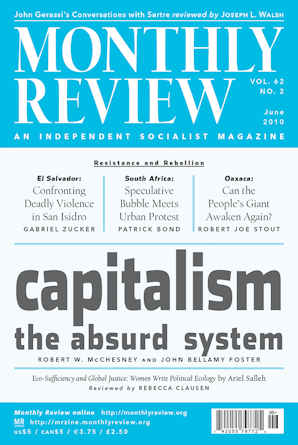Also in this issue
Article by Patrick Bond
- South Africa Suffers Capitalist Crisis Déjà Vu
- Africa Rising' in Retreat: New Signs of Resistance
- South Africa: Exploding with Rage, Imploding with Self-DoubtÑbut Exuding Socialist Potential
- South Africa's Resource Curses and Growing Social Resistance
- Labor, the State, and the Struggle for a Democratic Zimbabwe
- From Racial to Class Apartheid: South Africa's Frustrating Decade of Freedom
- Zimbabwe, South Africa, and the Power Politics of Bourgeois Democracy
- Political Reawakening in Zimbabwe

